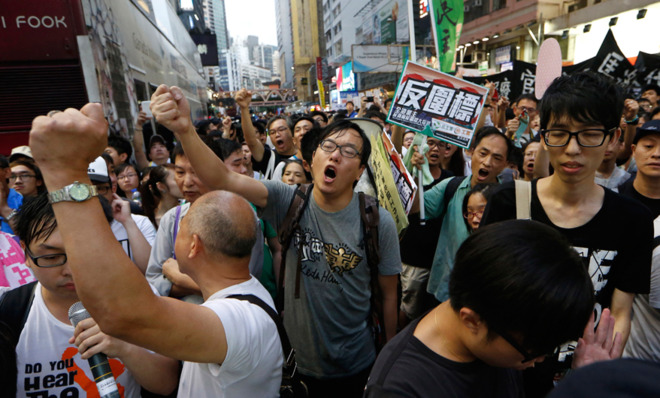Pay attention to the anti-China protests in Hong Kong


Hong Kong residents are up in arms about China. And in the past few days, they've staged the biggest pro-democracy demonstrations Asia has seen since the end of the British handover of Hong Kong to China in 1997. Almost 800,000 people have joined the protests.
Things have long been uneasy since China took over Hong Kong from the British. China had promised a "one country, two systems" approach to Hong Kong — but it has never been that simple.
The pro-democracy protest group Occupy Central staged an unofficial referendum last month. The questions: Should the chief executive of Hong Kong be elected directly? If so, how? By parties? By nominating committees? Should the election be open to everyone? Well, 800,000 people voted.
The Week
Escape your echo chamber. Get the facts behind the news, plus analysis from multiple perspectives.

Sign up for The Week's Free Newsletters
From our morning news briefing to a weekly Good News Newsletter, get the best of The Week delivered directly to your inbox.
From our morning news briefing to a weekly Good News Newsletter, get the best of The Week delivered directly to your inbox.
In response, the Chinese government released a white paper in early June saying that universal suffrage, a requirement of the 1997 "Basic Law," will be limited to candidates who are approved by Beijing.
This was the first communique of sorts, and its tone was reproachful. The message from Beijing: You don't quite get this "two systems, one country" concept, and we're a little bit worried that you don't pay us here in Beijing the proper respect. So, basically, we just wanted to say hi.
Pro-democracy forces in Hong Kong were already frothy. The letter spurred protests and a "lawyers' march," important because Hong Kongers are struggling to keep their judiciary system free from Chinese superintending.
How does China respond to this direct challenge to its authority? So far, the official Hong Kong response is that the referendum has no status. So far, for the most part, the police have not molested the demonstrators. But the protests are becoming angrier.
A free daily email with the biggest news stories of the day – and the best features from TheWeek.com
The Central, the city's financial heart, is locked down by the police, since the name of the protest group is ... Occupy Central, which they have yet to do.
Stay tuned.
Marc Ambinder is TheWeek.com's editor-at-large. He is the author, with D.B. Grady, of The Command and Deep State: Inside the Government Secrecy Industry. Marc is also a contributing editor for The Atlantic and GQ. Formerly, he served as White House correspondent for National Journal, chief political consultant for CBS News, and politics editor at The Atlantic. Marc is a 2001 graduate of Harvard. He is married to Michael Park, a corporate strategy consultant, and lives in Los Angeles.
-
 The doctors’ strikes
The doctors’ strikesThe Explainer Resident doctors working for NHS England are currently voting on whether to go out on strike again this year
-
 5 chilling cartoons about increasing ICE aggression
5 chilling cartoons about increasing ICE aggressionCartoons Artists take on respect for the law, the Fourth Amendment, and more
-
 Political cartoons for January 24
Political cartoons for January 24Cartoons Saturday's political cartoons include 3D chess, political distractions, and more
-
 The billionaires’ wealth tax: a catastrophe for California?
The billionaires’ wealth tax: a catastrophe for California?Talking Point Peter Thiel and Larry Page preparing to change state residency
-
 Bari Weiss’ ‘60 Minutes’ scandal is about more than one report
Bari Weiss’ ‘60 Minutes’ scandal is about more than one reportIN THE SPOTLIGHT By blocking an approved segment on a controversial prison holding US deportees in El Salvador, the editor-in-chief of CBS News has become the main story
-
 Has Zohran Mamdani shown the Democrats how to win again?
Has Zohran Mamdani shown the Democrats how to win again?Today’s Big Question New York City mayoral election touted as victory for left-wing populists but moderate centrist wins elsewhere present more complex path for Democratic Party
-
 Millions turn out for anti-Trump ‘No Kings’ rallies
Millions turn out for anti-Trump ‘No Kings’ ralliesSpeed Read An estimated 7 million people participated, 2 million more than at the first ‘No Kings’ protest in June
-
 Ghislaine Maxwell: angling for a Trump pardon
Ghislaine Maxwell: angling for a Trump pardonTalking Point Convicted sex trafficker's testimony could shed new light on president's links to Jeffrey Epstein
-
 The last words and final moments of 40 presidents
The last words and final moments of 40 presidentsThe Explainer Some are eloquent quotes worthy of the holders of the highest office in the nation, and others... aren't
-
 The JFK files: the truth at last?
The JFK files: the truth at last?In The Spotlight More than 64,000 previously classified documents relating the 1963 assassination of John F. Kennedy have been released by the Trump administration
-
 'Seriously, not literally': how should the world take Donald Trump?
'Seriously, not literally': how should the world take Donald Trump?Today's big question White House rhetoric and reality look likely to become increasingly blurred
